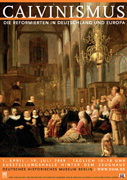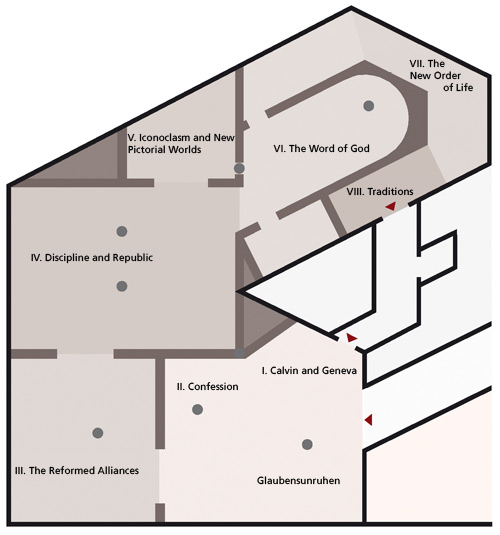


Exhibiton
| I. Calvin and Geneva
| II. The Confession
| III. The Reformed Alliances
IV. Discipline and Republic
| V. Iconoclasm and New Pictorial Worlds
VI. The Word of God
| VII. The New Order of Life
| VIII. Traditions
The work of the Genevan Reformer John Calvin can only be seen in context with a number of political and religious tendences and as part of the cultural and social history of Europe. The reformation of both church and state was one of the major tasks from the ending middle ages on. One of the early reformatory movements had been proceeded by John Hus, who was condemned and burned as heretic at the council of Constanze in 1415. A hundred years later the doctrine of Martin Luther was followed by humanists and evan - gelic circles in Europe and advanced by more radical reformers like Zwingi and Calvin. Apart from the reformation of the church they also called for a reformation of life. All reformeratory movements shared a strong consciousness for the Holy Scripture, emphazising the exclusive importance of the Word of God.
The conflicts about the true faith determined the subsequent centuries. In Germany the Reformed creed spread parallel to the teaching of Martin Luther, but could only become firmly established in individual regions. However, in large parts of northern and western Europe the Reformed creed became the most important Protestant movement, expressed in quite different ways. From Scotland to Hungary people embraced the new teachings, often at cost of expulsion and flight. They developed an active parish life and formed a tightly knit intellectual, charitable and political network extending across various regions and countries.
Like few other people the Genevan reformer exerted a deeply felt, varied and enduring influence on the areas of science, politics, art and the human frame of mind. Reformed ideals such as work ethic and time management appear to be as evident in everyday life today as in social standards and systems of state. Calvinist citizens marked the development of a modern economy, while Calvinist politicians played a dominant role in the shaping of a modern republican form of statehood.

